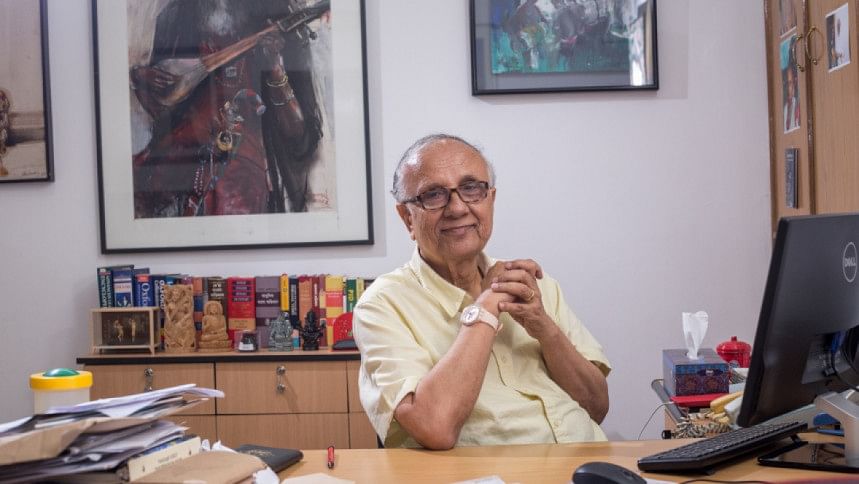Reflections with Ramendu Majumdar on his 80th birthday

Ekushey Padak awardee Ramendu Majumdar played an integral role in enriching the theatre arena in Bangladesh. By establishing the well-known troupe, Theatre, he has kept the theatre stage alive with his tireless efforts. Also known as one of the pioneers of Bangladesh's theatre movement, the renowned cultural personality has been a part of most of the mass movements in the country. He is a two-time president of the International Theater Institute (ITI). He is currently the honourary president of the ITI. In a candid chat with The Daily Star on his 80th birthday, he reflects on his journey, and more.
What does your birthday mean to you?
(Laughs) I have lived a long life, but the pursuits of human beings remain unsatisfied. We only get to live our life once. Every day, we feel the love and affection for life, our dear ones, and the world that surrounds us. A sorrow of leaving all this behind encompasses me at this point. If I got the chance to live my life from the start once again, I would like to do more meaningful work.
Stage plays speak about society and politics significantly. Do you believe that after 50 years of independence, Bangladesh's socio-political conditions have improved?
The society has moved forward, and so has politics. However, the question is, are we headed towards the right direction? Our main aspiration after the Liberation War was that there will be no communalism. In light of secularism, we will follow the written constitution. Materialistically, we have made progress, but in the case of morality, we lag behind – the political parties are more responsible for this than the society. There is no adherence to morality. Rather, there exists bigotry and communalism. The religion-based politics in Bangladesh is something that I do not believe in.
If our country was more culture-oriented, morality would have endured. We should think more about the interest of others, rather than our own selves. Only then, the power of the society will be awakened. We cannot depend on the government for everything. In these trying times of the Covid-19 pandemic, people have come forward to help each other. We have to keep this up, to make things better.
Have the traditions and glory of our stage plays faded to a great extent?
No, the glory of stage plays has not at all faded. During the 70s, 80s and 90s, we had fewer theatre groups, which resulted in better productions that got everyone's attention. Now, the number of the groups has grown. Good plays are being made, but perhaps, they are not receiving the deserved attention.
One has to keep up with the changing realities. Looking back at when we used to work, I realise that we felt a lot of joy in working, despite the obstacles. The technologies have changed, and so has many things around us. There are still good work going on, and we need to adapt to the changes.
What do you think is the reason behind well-made plays not getting the rightful attention of the audience?
The lack of event spaces and auditoriums is the biggest problem. The number of stages has not increased the way that the audience has. Dhaka has grown bigger, and places like Uttara, Gulshan, Banani, Mirpur, Dhanmondi, an Old Dhaka require cinema halls. That is why the theatre groups in our city are not getting many opportunities to perform.
The number of venues for plays will have to be increased, and the government has to take the main responsibility for it. So far, we haven't seen any effective initiatives from them.
It is seen that occasionally our television productions and web series give rise to many discussions, and hard-hitting criticism. Some say that television productions are not well-made, while others say that web shows are becoming the cause for the degeneration of society. What are your thoughts on this?
The final judgement is for the audience to make. If they don't like something, it will fade away. If they do, then it will be talked about for years. We need responsibility from the makers of the productions. We cannot work with the pressure of censorship. It is the age of technology, and there will be a wide body of work. But one needs to be responsible in making each project. Television channels will have to be responsible as well.
What do you think about the challenges facing our film industry today?
The main challenge is that not all viewers go to cinema halls, and hence, the halls are closing. There is no environment for cinema halls anymore. In addition, people are getting to watch films right from the comfort of their homes, so, why would they go out and spend money on movies?
There was a time when we made a hundred movies yearly. Now, that number has decreased significantly. Our filmmakers are making movies according to the taste of the masses. However, parallel cinema has carved a space for itself today. But there are no spaces to showcase such cinema, which I think is the biggest crisis right now. The number of cinema halls needs to be increased, and we need concerted efforts towards the prosperity of our films.
On this birthday, would you rather look back, or plan your life ahead?
Of course, I look ahead. I want to keep myself immersed in my work. I think about doing more work. My vow is for the welfare of the humankind. I don't just think of being happy alone, I think of how I can be happy with everyone else in my life. I believe that working for the welfare of others is my purpose.
Translated by Mormee Mahtab

 For all latest news, follow The Daily Star's Google News channel.
For all latest news, follow The Daily Star's Google News channel. 



Comments